Czy kiedykolwiek próbowałeś otworzyć jeden ze swoich postów WordPress tylko po to, aby zostać powitanym przez błąd 404? Czasami doświadczamy tego, gdy pracujemy nad własnymi witrynami WordPress lub pomagamy naszym użytkownikom.
Błąd ten pojawia się, gdy można uzyskać dostęp do obszaru administracyjnego WordPress i bloga, ale przy próbie otwarcia konkretnego posta pojawia się komunikat “404 Not Found”.
Pozorne zniknięcie treści może być frustrujące, ale znaleźliśmy kilka obejść, które poprawią ten problem. W tym kompletnym przewodniku pokażemy, jak poprawić posty WordPress zwracające błędy 404.
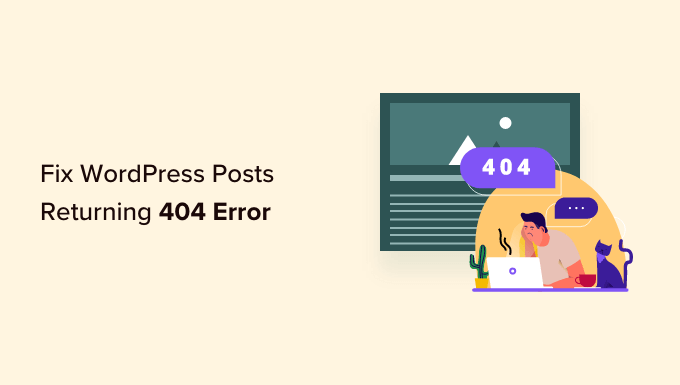
Dlaczego moje wpisy na WordPressie zwracają błąd 404?
Istnieje kilka powodów, dla których Twoje posty mogą wyświetlać błąd 404 “Nie znaleziono strony” w WordPress. Mogą one obejmować:
- Konflikty wtyczek lub motywów: Czasami wtyczki lub motywy, które zainstalowałeś na swojej witrynie, mogą zakłócać sposób, w jaki WordPress obsługuje bezpośrednie odnośniki. Może to prowadzić do niedziałających odnośników i błędów 404.
- Problemy z własnym kodem: Jeśli dodałeś niestandardowy kod do swojej witryny internetowej, mogą występować błędy w kodzie, które mają wpływ na bezpośrednie odnośniki lub powodują inne konflikty, powodując błędy 404 dla twoich wpisów.
- Problemy z plikiem .htaccess: Plik .htaccess odgrywa rolę w strukturze adresów URL WordPress. Jeśli plik ten jest uszkodzony lub go brakuje, może to prowadzić do błędów 404 dla postów lub stron.
Jak znaleźć wszystkie posty WordPress z błędem 404?
Zanim przejdziemy do rozwiązań, dobrze byłoby dowiedzieć się, czy ten błąd występuje tylko w jednym lub dwóch postach, czy w wielu postach. W ten sposób można określić zakres problemu i wybrać najbardziej odpowiednie rozwiązanie.
Jednym z łatwych sposobów, aby to sprawdzić, jest skorzystanie z Google Search Console. Jeśli jeszcze nie przesłałeś swojej witryny do Google Search Console, przeczytaj nasz przewodnik na temat dodawania witryny WordPress do Google Search Console.
Gdy bot Google zaindeksuje Twoją witrynę, Google Search Console dostarczy Ci szczegółowych informacji o jej wydajności, w tym o napotkanych błędach 404.
Aby dowiedzieć się, które posty zwracają błędy 404, możesz zalogować się do kokpitu Search Console. Następnie przejdź do raportu “Strony”, a zobaczysz szczegółową listę wszystkich błędów.
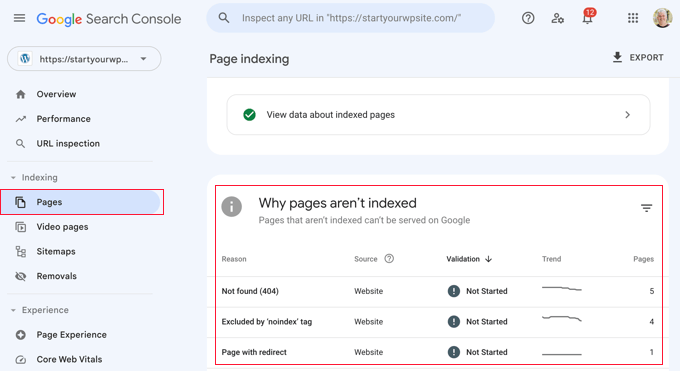
Aby uzyskać więcej informacji, możesz przeczytać naszą listę wskazówek dotyczących korzystania z Google Search Console w celu zwiększenia ruchu w witrynie, która zawiera kilka wskazówek, jak poprawić błędy 404 za pomocą tego narzędzia.
W związku z tym przyjrzyjmy się, jak poprawić wpisy WordPress zwracające błędy 404. Możesz skorzystać z poniższych odnośników, aby przejść bezpośrednio do różnych rozwiązań:
Nie masz czasu na samodzielne poprawki błędów 404? Usługi WPBeginner Pro mogą pomóc! Dzięki naszemu niedrogiemu wsparciu WordPress w nagłych wypadkach możesz zatrudnić ekspertów, którzy poprawią błędy 404, niedziałające linki, problemy z przekierowaniami i wiele więcej. Przestań stresować się problemami z WordPressem i popraw je! Zaplanuj awaryjną obsługę WordPress już dziś!
Metoda 1: Sprawdzenie konfliktów wtyczek lub motywów i problemów z własnym kodem
Czasami wtyczki, motywy lub niestandardowy kod dodany do witryny WordPress mogą zakłócać permalinki lub powodować konflikty, prowadząc do błędów 404. Doświadczyliśmy tego nawet sami podczas testowania narzędzi na naszej stronie demonstracyjnej.
Jednym ze sposobów rozwiązania tego problemu jest tymczasowe wyłączanie wtyczek. Wtyczki mogą czasami zakłócać sposób, w jaki WordPress obsługuje odnośniki.
Po wyłączeniu wtyczek możesz je ponownie aktywować, sprawdzając jednocześnie, czy błąd 404 pojawia się ponownie po włączaniu każdej z nich. Jeśli błąd pojawia się po włączaniu konkretnej wtyczki, to ona może być winowajcą.
Następnie można szybko wyszukać w Google rozwiązania związane z tą wtyczką lub skontaktować się z twórcą wtyczki w celu uzyskania obsługi.
Podobnie, twój motyw WordPress może powodować konflikt.
Aby to sprawdzić, możesz tymczasowo przełączyć się na domyślny motyw WordPress, taki jak Twenty Twenty-Three lub Twenty Twenty-Four. Wystarczy przejść do Wygląd “ Motywy i kliknąć “Włączanie” domyślnego motywu.

Jeśli błąd 404 zniknie z domyślnym motywem, oznacza to potencjalny konflikt z twoim obecnym, aktualnym motywem. Możesz wtedy spróbować rozwiązać problem z motywem lub rozważyć użycie innego motywu.
Możesz sprawdzić nasz ekspercki wybór najpopularniejszych motywów WordPress, aby uzyskać rekomendacje.
Jeśli niedawno wstawiłeś fragmenty kodu do twojej witryny internetowej, mogą występować błędy w kodzie powodujące błędy 404. Przyjrzyj się uważnie dodanemu kodowi i sprawdź, czy możesz zidentyfikować jakieś błędy.
Najbezpieczniejszym sposobem dodawania fragmentów kodu do WordPressa jest użycie wtyczki WPCode. Wtyczka ta pozwala wstawić własny kod bez bezpośredniej pracy z plikami motywu, zmniejszając ryzyko zepsucia twojej witryny internetowej.
Ponadto, gdy WPCode wykryje błąd w twoim kodzie, automatycznie wyłączy fragment kodu i poprosi cię o jego sprawdzenie. Możesz również użyć trybu testowego, aby sprawdzić, czy twój kod działa, zanim prześlesz go do swojej witryny internetowej.
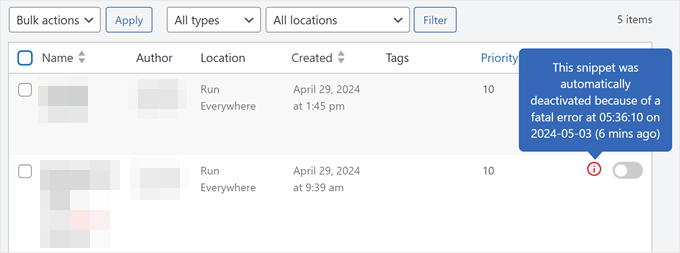
Jeśli żadne z tych rozwiązań nie zadziała, przejdź do następnej metody, w której rozwiążemy problemy z ustawieniami twojego bezpośredniego odnośnika.
Metoda 2: Popraw ustawienia twojego permalinka
Wpisy WordPress mogą zwracać błędy 404 z powodu problemów z regułami przepisywania w twoim pliku .htaccess. W większości przypadków możesz poprawić ten problem, aktualizując ustawienia bezpośredniego odnośnika.
Po prostu przejdź do Ustawienia ” Bezpośrednie odnośniki w twoim panelu administracyjnym WordPress i kliknij przycisk “Zapisz zmiany”.
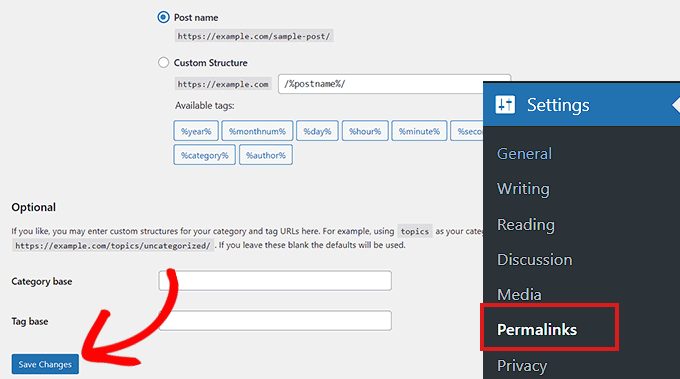
Nie ma potrzeby wprowadzania zmian w samych ustawieniach bezpośrednich odnośników. Zaktualizuje to twoje ustawienia bezpośredniego odnośnika i wyczyści reguły przepisywania.
W większości przypadków rozwiązanie to poprawi błąd 404 wpisów WordPress. Jeśli jednak nie działa ono w twoim przypadku, to prawdopodobnie musisz ręcznie zaktualizować swój plik .htaccess.
Metoda 3: Aktualizacja pliku .htaccess WordPressa
Zanim zaczniesz, upewnij się, że najpierw wykonałeś kopię zapasową twojego pliku .htaccess WordPress. Jeśli coś pójdzie nie tak, możesz łatwo przywrócić oryginalny plik.
Teraz musisz połączyć się z twoim serwerem za pomocą klienta FTP, takiego jak FileZilla lub aplikacji File Manager w kokpicie hostingu WordPress.
Następnie należy znaleźć i edytować plik .htaccess, który znajduje się w tej samej lokalizacji co katalogi takie jak /wp-content/ i /wp-includes/.
Wystarczy kliknąć plik prawym przyciskiem myszy i wybrać opcję “Uprawnienia pliku”.
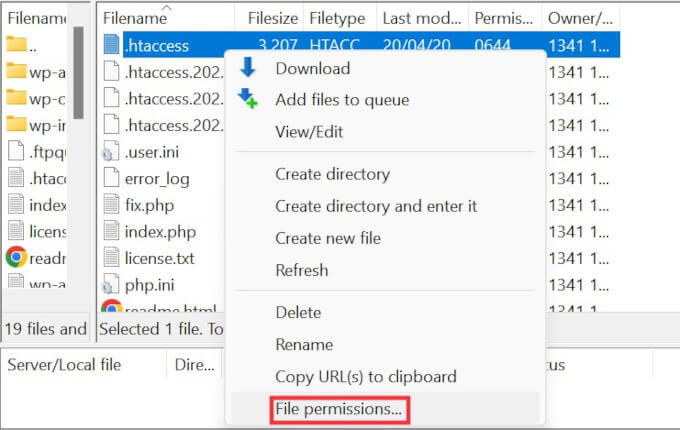
Plik można zapisać, zmieniając jego uprawnienia na 666.
Po prostu wpisz “666” w polu “Wartość liczbowa”, a następnie kliknij “OK”.
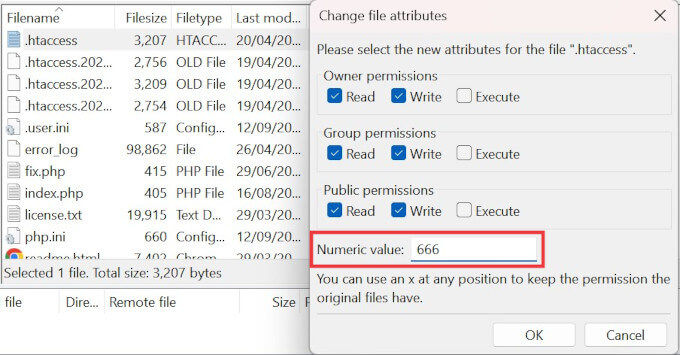
Następnie należy powtórzyć kroki z pierwszej metody naszego poradnika. Po wykonaniu tej czynności nie zapomnij zmienić uprawnień z powrotem na 660.
Można również edytować plik i dodawać do niego kod.
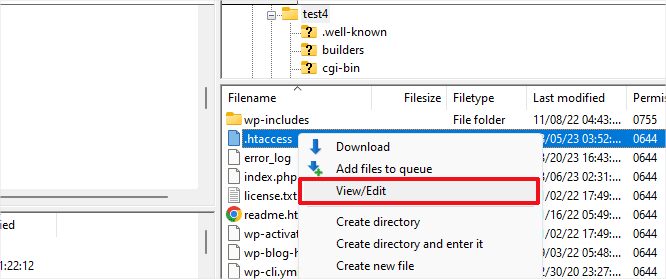
Po otwarciu pliku .htaccess za pomocą edytora tekstu, wystarczy wstawić ten kod:
1 2 3 4 5 6 7 8 9 10 | # BEGIN WordPress<IfModule mod_rewrite.c>RewriteEngine OnRewriteBase /RewriteRule ^index\.php$ - [L]RewriteCond %{REQUEST_FILENAME} !-fRewriteCond %{REQUEST_FILENAME} !-dRewriteRule . /index.php [L]</IfModule># END WordPress |
Metoda 4: Skontaktuj się z dostawcą hostingu
Jeśli żadne z powyższych rozwiązań nie naprawiło błędu 404 zwracającego wpisy WordPress, zalecamy skontaktowanie się z dostawcą hostingu WordPress. Może to być błąd po ich stronie lub mogą oni pomóc w rozwiązaniu problemu.
Zapoznaj się również z naszym przewodnikiem na temat tego, jak prawidłowo poprosić o pomoc techniczną WordPress i ją uzyskać.
Metoda 5: Włącz mod-rewrite (lokalna instalacja WordPress)
Jeśli używasz regionalnego serwera do celów testowych, musisz włączyć mod_rewrite w konfiguracji Apache twojej witryny MAMP, WAMP lub XAMPP.
Pozwoli to WordPressowi na generowanie czystych adresów URL i zapobiegnie błędowi 404 dla wpisów i stron na twoim serwerze lokalnym.
Sposób wykonania tej czynności zależy od używanej platformy. Osoby korzystające z XAMPP mogą otworzyć swój panel sterowania i kliknąć przycisk “Konfiguracja” w ramach działań. Następnie należy wybrać “Apache (httpd.conf)”.
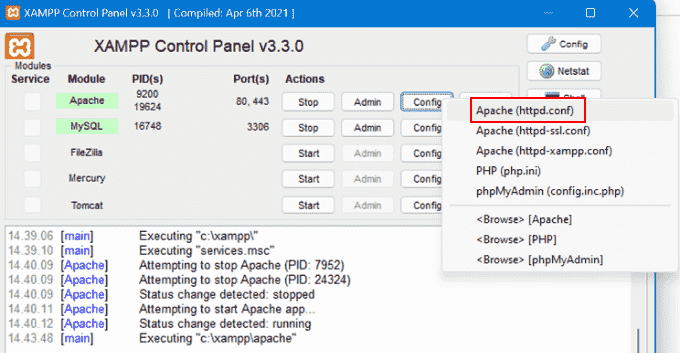
Następnie należy znaleźć linię #LoadModule rewrite_module modules/mod_rewrite.so i usuwać ‘#’, aby ją odkomentować.
Spowoduje to wczytywanie mod_rewrite.
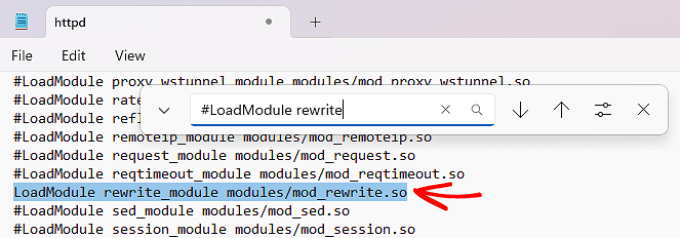
Następnie znajdź wszystkie instancje AllowOverride None i zmień je na AllowOverride All.
Wartość “All” oznacza, że wszystkie dyrektywy mogą zostać zastąpione.
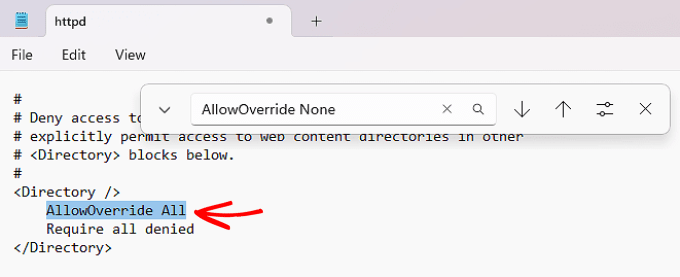
Po zakończeniu można zapisać plik httpd.conf i zamknąć go. Następnie w panelu sterowania XAMPP kliknij “Stop” na module Apache i “Start” ponownie, aby go ponownie uruchomić.
Następnie wróć do kokpitu administratora, aby sprawdzić, czy twoje bezpośrednie odnośniki działają.
Film instruktażowy
Jeśli potrzebujesz instrukcji wizualnych, obejrzyj poniższy film.
Mamy nadzieję, że ten artykuł pomógł Ci rozwiązać problem postów zwracających błędy 404 w WordPress. Możesz również zapoznać się z naszym przewodnikiem po najczęstszych błędach WordPress i sposobach ich poprawki, a także z naszymi eksperckimi propozycjami najlepszych wtyczek WordPress do rozwoju Twojej witryny.
If you liked this article, then please subscribe to our YouTube Channel for WordPress video tutorials. You can also find us on Twitter and Facebook.





Rj
thanks man u saved my life
Phannipha
Thank you for very useful sharing. Just only one click can solve the problem:)
Ehiz Mikey
A million thanks Syed. I was stuck here for a couple of weeks. A fix indeed.
Kaycee
Hi. Really nice article.
I had a 500 internal server error issue with my site when I tried using the W3 Total Cache plugin.
To fix this, I renamed the .htaccess file to .htaccessbak. After doing this, I noticed that the 500 error cleared but then I got a 404 error! All the links and pages on my site returned a 404.
On the All Pages section, I see a link that says “Purge from cache”
Please what do I do to clear this issue?
Stanley
You’re a life saver, worked for me.
Really grateful,
Thank you
syed
thanks it works for me….
Christian Fraunholz
but why is that happening and how to fix it forever?
Karma
I tried to follow your direction in fixing my problem, it took for about a day, but I didn’t find the good result.
Then I gave up and contacted my hosting. And it fixed only in 5 minutes. Lol the problem came from the hosting…
Mark Kay
By careful with post variables names. I had a contact form with an input field called “name”, that caused WordPress to show the 404 page. Took me a long time to figure out the problem. I fixed it be changing the field name from “name” to “your-name”.
Ivan
thanks you saved my life.
Ramzan
My problem is that I m going to wp adminin
And want to edit post it is not going in edit mode of post and page gives me error page not found 404 but my site and its pages are opening well in browser
Plz guide me I can solve this problem
Ben
Samo rpoblem here. Cannot edit the existing posts or add new one. I get 404 for both
Sunit
Hi, I have tried following the above steps but my issue is this: when I visit my website directly by putting typing the url, then it works fine. But, when i type in my site url in google search box and then click on the link from the search results, I get the 404 error or message saying “your connection is not private”.
My website is http://www.example.com but google search result shows it as https://example.com/
So not sure what the issue is. I used to have wordpress.com but now I am dong self-host using HG.
Any help will be appreciated.
Thanks
WPBeginner Support
www is considered a subdomain of a domain. So basically a site with www and without www will be considered two different sites by search engines. Go to Settings > General page to change your site URL from http://www.example.com to just example.com.
WordPress.com enabled https for all custom domains on WordPress.com. This means Google had already crawled your website with https in the URL. You can install free https using Let’s Encrypt.
Admin
Paul Nicholson
Great worked for me thanks!!
Shashdhar S
Thanks a lot , the second option worked for me ….. Thank you so muich
eliana
Just THANK YOU!
eli
WPBeginner Support
You are welcome Don’t forget to follow us on Twitter for more WordPress tips.
Don’t forget to follow us on Twitter for more WordPress tips.
Admin
Michaela
hi, I tried first solution, nothing happened. I wanted to try the second, but I cannot find the .htaccess file. Not in FTP, not even in my WP online editor. I had this issue today for the first time. I use WPML plugin, until now everything went without problem, but today my translated post in English throws this 404 Error. Any idea what shall I do if I cannot locate the .htaccess file?
Thanks!
Michaela
I noticed one thing. The post in the editor shows me the following link:
example.com/2016/09/15/where-eat-in-barcelona/?lang=en
but when I click to see the post, or from any RSS feed click on the published post, the link showing 404 error is as follows:
example.com/?p=11409&lang=en
WPBeginner Support
Please take a look at our guide on why you can’t find .htaccess file on your WordPress site.
Admin
Shirish Dhungel
Well thanks! I remember, that WP Super Cache official stated to remove rewrite code from .htaccess. After that, my posts redirected to 404. Thanks to you, now my site is perfectly fine.
Muhammad Nasir
Thanks it worked for me, thank you so much.
Akhelesh
Do I have to remove the code snippet I added to htacces file after my problem has been solved?
Jessica
Can someone contact me please? I am so new to these I don’t even know what a FTP server is…
WPBeginner Support
Please see our guide on using FTP.
Admin
Rohan khamkar
Sir, when I post a new post it gives me error that 404 page not found. Previously everything was fine but when I add a new user and give him a role of administrator from that time I can’t post new post. Any solution Please. Thank you in advance.
WPBeginner Support
You should never give administrator role to a user you don’t trust. You can always change back their role by going to Users page and then clicking on the Edit link below the user that you want to change. After that you check your site’s permalink structure. See if they installed any new plugin and if they did, then deactivate that plugin.
Admin
Shivani Sehdev
Wow……….. Solved a long ago problem .
Thanks A lot.
R Donahoo
Didn’t work on my apache server. Had an additional step to allow mod_rewrite to actually work. Edit your httpd.conf file and add ‘Allowoverride all’. For example:
DocumentRoot /var/www
find the section that sets up the directory options, such as:
Options Indexes FollowSymLinks MultiViews
Order allow,deny
allow from all
add Allowoverride all
Options Indexes FollowSymLinks MultiViews
AllowOverride all
Order allow,deny
allow from all
save and restart the web server to re-read the updated configuration.
All was well after that.
Thanks for your useful post moving me into the right direction.
Arnaud
forgot about htis #yaDaMan
Ben
Didn’t work for me either
Where can I find this file you are talking about
aderele olutayo samuel
this worked. …. Thanks
Eva
I found the some problem. However, I could not log in to the admin page. Could you give solution to mitigate this problem?
Rodrick Green
This was very easy and very helpful. THANKS A LOT!!!
B Pandey
thanks for your usefull tip. It worked for me on my website. Thanks a lot
sheldon
Thank you .
It worked for me
Rachit Sharma
but not working for me when i updated permalink with post name and change .htcces file but not worked. any other solution for that.
Ahsan
Wowww Thank you so much, that was really helpful.
In my case it was WAMP server, after turning on “rewrite module” in apache, my problem was solved.
Thanks.
Kailash
Wow – this still works. Done a search on google and found articles in wordpress but this was by far the simple-est and bang it works.
Thanks a mill – saved me a heap of time
WPBeginner Support
Glad you found it helpful.
Admin
Shawn Ritch
Hello and thanks for all the useful tips. Unfortunately, this tip didn’t work for me. I re-saved my permalinks in WordPress settings (didn’t work) so then I tried your next method and it didn’t work either. I’m thinking the reason for this is because I have different permissions. My original permission is 644. When I change permission to 660 none of my pages work so I believe the 666 permission is wrong as well. I’m using a Go Daddy server if that helps any :/
I’m at a loss and have no idea what to do from here. However, I can’t afford to have pages that don’t work. Any suggestions would be greatly appreciated.
Thanks
Shawn Ritch
Kevin Garcia
I tried this and it didn’t help me!!! My whole website crashed and had to restore it!!
Hannah Brown
Thanks, yours was the only place that told me HOW to fix my broken links! You’re the best
WPBeginner Support
Glad you found it helpful.
Admin
Kunal Yande
Thanks !!
You save my so much time….
Chris
How do I fix the issue when I upload a new plugin and then my categories, not posts, become 404?
Bob
This is great advice. I thought I was going to have to take a deep dive, but two clicks and I’m GTG. Thanks!
Ronn Reason
hi
i keep getting this message with my email account;
Error Oops… a server error occurred and your email was not saved. (#404)
Please advise ASAP
Gabo
O.O
I can’t belive this …. it works, thanks !!!!!
Steve
I had this problem after moving sites to a new server. Default Permalinks worked, but not the settings I was using.
I needed the apache server to “Allow Override” for the htaccess file to take effect.
Vivek
Hi,
I need a little help regarding 404 error.
I am getting 404 error in my Page 2 section.
I have googled a couple of times. but did not get the solution.
Could you please tell me what is the reason for it?
Rudy
My site links will work ONLY after I’ve VIEWED the permalink settings, without any changes, and Voila! The links work again. What is causing this and how can I program this instead of having to log in?
I’ve tried the following commands in WP-CLI to no avail:
wp rewrite flush –hard –path=c:\xampp\htdocs\mywordpress
wp cache flush –path=c:\xampp\htdocs\mywordpress
Amit Schandillia
This saved my life!!!!!
Patrick
Thanks man, just pressing the “Save changes” on the permalink-settings page did it for me! Cheers!
Amanda
Hi there,
About an hour ago I was able to remedy a pesky ‘500 Internal Service Error’ by following your sage advice and renaming the .htaccess file to .htaccess_old. I was immediately able to access my wp-admin area–and I thought–get going again.
Unfortunately, something happened which rendered all of my other pages unfindable; each kicking a 404 error.
I attempted the steps you provided above, but to no avail. Might you have any further suggestions?
Thank you.
Jessa
You guys are awesome, this was easy and fast. You guys save me a trouble!
mehdi
why i coudl not see my post?
after I send a post my preveous posts appear.
it made me crazy please remove previous post
…
I found a solution to my problem and will say in next post
mehdi
Hello agin
thank you for this useful article/ I found a bug in wordpress in rtl language in displaying permalink
I read your article and encourage to solve the problem with your contribute.
——————————————
my problem in detail:
1-I created a mysql database(in utf8 general ci)
2-I installed last wordpress versin(locally) and install my theme(multiup v 1.2 from themeforst)
3-Next I did import demo as whele.
in the theme admin panel exixst category portfolio (in this section we create our category with name and slug) then in all post under portfolio section we can create our posts and determine category of post from portfolio category) finally in homepage we have a section that shows portfolio post in category(with their picture)
In english slug and name the category of portfolio show well but when i change category in portfolio category( slug) into rtl language the category in homepage canvert into charachter like base 64(I think that my slug convert into ansi ie each character convert into 6 charachter)
How I can overcome my problem?I think I must avoid change slug or show slug into utf8 or unicode . I am beginer in wpordpress , If I khnew wordpress more I could solve this simple problem .Any one with khnowledge of handling hoock and filter and plugin and wordpress can solve this permalink problem . I sure I will solve this problem with your help.
———————————-
I tried the second way you offer (that phpmyadmin in utf8generalci) but it doee not work for me.
before thansk a lot for helping me.I followed your posts regularly .
……………………………….
1- first I did the trick in above article (this is so good but didnot solve my problem)
2-
mehdi
hello
thanks to contribute you knowledge to others .my english is not well.excuse me.
I download a wordpress theme with portfolio link in admin panel that in porftoli section we can define some category with name and slug . in post we can determine category from portfolio.
in homepage we can display post in portfolio category! all thing is ok but wen i chang name and slug into rtl language the title of a group in home page shows like this %d8%a8%d8%b1%d9%86%d8%af%d8%b3%d8%a7%d8%b2%db%8c
i did your solution in this topic and that another topic(How To Enable Custom Permalinks) but not woks for my problem!
WPBeginner Support
This could happen if your WordPress database is not using UTF-8 character encoding. Please make sure that your database is using utf8_general_ci as collation. You can check that using phpMyAdmin from cpanel. Before you make any changes to your database, please create a complete WordPress backup first.
Admin
Atula Gupta
Thank you so much for fixing my problem in seconds! I was panicking about all my posts giving this error and this solution was so simple! Thanks again.
Sammy
Thank you, thank you! This was making me crazy and you just helped me fix it in 2 seconds. High five.